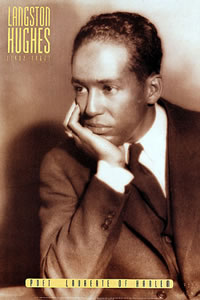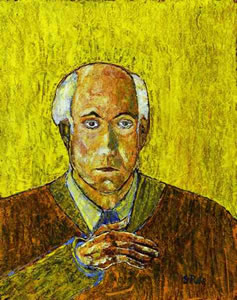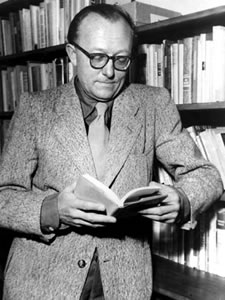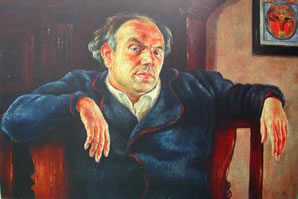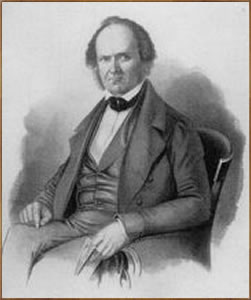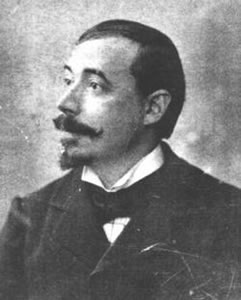De Oostenrijkse dichter en schrijver Hugo von Hofmannsthal werd geboren op 1 februari 1874 in Wenen. Zie ook mijn blog van 1 februari 2007 en ook mijn blog van 1 februari 2008.
Dein Antlitz. . .
Dein Antlitz war mit Träumen ganz beladen.
Ich schwieg und sah dich an mit stummem Beben.
Wie stieg das auf! Daß ich mich einmal schon
In frühern Nächten völlig hingegeben
Dem Mond und dem zuviel geliebten Tal,
Wo auf den leeren Hängen auseinander
Die magern Bäume standen und dazwischen
Die niedern kleinen Nebelwolken gingen
Und durch die Stille hin die immer frischen
Und immer fremden silberweißen Wasser
Der Fluß hinrauschen ließ – wie stieg das auf !
Wie stieg das auf! Denn allen diesen Dingen
Und ihrer Schönheit – die unfruchtbar war –
Hingab ich mich in großer Sehnsucht ganz,
Wie jetzt für das Anschaun von deinem Haar
Und zwischen deinen Lidern diesen Glanz!
Der Jüngling in der Landschaft
Die Gärtner legten ihre Beete frei,
Und viele Bettler waren überall
Mit schwarzverbundnen Augen und mit Krücken
Doch auch mit Harfen und den neuen Blumen,
Dem starken Duft der schwachen Frühlingsblumen.
Die nackten Bäume ließen alles frei:
Man sah den Fluß hinab und sah den Markt,
Und viele Kinder spielen längs den Teichen.
Durch diese Landschaft ging er langsam hin
Und fühlte ihre Macht und wußte – daß
Auf ihn die Weltgeschicke sich bezogen.
Auf jene fremden Kinder ging er zu
Und war bereit, an unbekannter Schwelle
Ein neues Leben dienend hinzubringen.
Ihm fiel nicht ein, den Reichtum seiner Seele,
Die frühern Wege und Erinnerung
Verschlungner Finger und getauschter Seelen
Für mehr als nichtigen Besitz zu achten.
Der Duft der Blumen redet ihm nur
Von fremder Schönheit – und die neue Luft
Nahm er stillatmend ein, doch ohne Sehnsucht:
Nur daß er dienen durfte, freute ihn.
Ein Knabe stand ich
Ein Knabe stand ich so im Frühlingsglänzen
und meinte aufzuschweben in das All,
unendlich Sehnen über alle Grenzen
durchwehte mich in ahnungsvollem Schwall !
Und Wanderzeiten kamen, rauschumfangen !
Da leuchtete manchmal die ganze Welt,
und Rosen glühten, und die Glocken klangen
von fremdem Lichte jubelnd und erhellt:
Wie waren da lebendig alle Dinge
dem liebenden Erfassen nah gerückt,
wie fühlt’ ich mich beseelt und tief entzückt,
ein lebend Glied im großen Lebensringe !
Da ahnte ich, durch mein Herz auch geleitet,
den Liebesstrom, der alle Herzen nährt,
und ein Genügen hielt mein Ich geweitet,
das heute kaum mir noch den Traum verklärt
Hugo von Hofmannsthal (1 februari 1874 – 15 juli 1929)
De Duitse dichter en schrijver Günter Eich werd geboren op 1 februari 1907 in Lebus an der Oder. Zie ook mijn blog van 1 februari 2007 en ook mijn blog van 1 februari 2008.
Mein Garten
Schön ist mein Garten mit den goldnen Bäumen,
Den Blättern, die mit Silbersäuseln zittern,
Dem Diamantentau, den Wappengittern,
Dem Klang des Gong, bei dem die Löwen träumen,
Die ehernen, und den Topasmäandern
Und der Volière, wo die Reiher blinken,
Die niemals aus dem Silberbrunnen trinken…
So schön,: ich sehn mich kaum nach jenem andern,
Dem andern Garten, wo ich früher war.
Ich weiß nicht wo… Ich rieche nur den Tau,
Den Tau, der früh an meinen Haaren hing,
Den Duft der Erde weiß und feucht und lau,
Wenn ich die weichen Beeren suchen ging . . .
In jenem Garten, wo ich früher war…
Inventur
Dies ist meine Mütze,
dies ist mein Mantel,
hier mein Rasierzeug
im Beutel aus Leinen.
Konservenbüchse:
Mein Teller, mein Becher,
ich hab in das Weißblech
den Namen geritzt.
Geritzt hier mit diesem
kostbaren Nagel,
den vor begehrlichen
Augen ich berge.
Im Brotbeutel sind
ein Paar wollene Socken
und einiges, was ich
niemand verrate,
so dient er als Kissen
nachts meinem Kopf.
Die Pappe hier liegt
zwischen mir und der Erde.
Die Bleistiftmine
lieb ich am meisten:
Tags schreibt sie mir Verse,
die nachts ich erdacht.
Dies ist mein Notizbuch,
dies ist meine Zeltbahn,
dies ist mein Handtuch,
dies ist mein Zwirn.
Günter Eich (1 februari 1907 – 20 december 1972)
De Duitse schrijver Dieter Kühn werd geboren op 1 februari 1935 in Keulen. Zie ook mijn blog van 1 februari 2008.
Uit: Frau Merian!
“JA, SO WIRD ÜBER MARIA SIBYLLA MERIAN GERN ERZÄHLT: Schon als Kind, als Mädchen von dreizehn, begann sie zu forschen, zuerst bei den Raupen des Seidenspinners, und früh schon, auffallend früh zeigte sich ihre Begabung als Zeichnerin, und sie nutzte einen Aufenthalt in den Niederlanden, beim Stiefvater, um einem Grafen eine (sicherlich geflammte) Tulpe zu stibitzen, sie zeichnete diese rote und weiße Blüte im verborgenen Kämmerlein, wurde dennoch entdeckt, doch zur Empörung kam Staunen: Das ist ja eine kleine Künstlerin …! So setzte sich das fort, das Zeichnen, das Aquarellieren, das Kupferstechen und: das Forschen; sie wies, offenbar als Erste, die gesamte Entwicklung von Insekten nach, vom Ei über die Raupe oder Larve zur Krabbel- ode
r Flugform, entdeckte als Erste auch die Symbiose von Raupe und Wirtspflanze, stellte diese Zusammenhänge in Illustrationen dar, entwickelte sich darüber hinaus, zu einer der führenden Malerinnen von Stilleben. Und sie lernte einen Mann kennen. Johann Andreas Graff, einen Schüler ihres Stiefvaters, sie heirateten, es kam das erste Kind auf die Welt, sie zogen nach Nürnberg, arbeiteten gemeinsam weiter, sie an Blumenbildern, er an Stadtbildern, sie publizierte ihr Blumenbuch, und weiterhin sammelte sie Raupen, die anderen eklig waren, nahm sie zu Dutzenden mit nach Hause, fütterte sie, um die Verwandlung , die Metamorphose zu beobachten, da kümmerte sie nicht weiter das Geschwätz in der Stadt, sie riskierte es, womöglich als Hexe vor Gericht gestellt zu werden, andererseits galt ihre Haushaltsführung als vorbildlich, doch schien es Probleme in der Ehe zu geben, erst ein Jahrzehnt nach Johanna Helena wurde Dorothea Maria geboren, zugleich das letzte Kind, Frau Graff setzte sich mit den beiden nach Frankfurt ab, veröffentlichte dort den zweiten Teil ihres Raupenbuchs, zog dann, von Töchtern und Mutter begleitet, ins niederländische Friesland, wurde dort, vermittelt durch ihren Halbbruder Caspar, von einer pietistischen Kommune aufgenommen, erreichte auf diese Weise, was sie vor dem Nürnberger Magistrat nicht hätte durchsetzen können: die Trennung; sie ließ ihren angereisten Mann in eine Falle laufen, entzog sich ihm souverän, wurde dabei von Töchtern und Mutter unterstützt, drei Generationen Merian-Frauen solidarisch, der Mann zog geschlagen ab.”

Dieter Kühn (Keulen,1 februari 1935)
De Nederlandse schrijver Frits Bernard Hotz werd geboren op 1 februari 1922 in Leiden. Zie ook mijn blog van 1 februari 2007 en ook mijn blog van 1 februari 2008.
Uit: Zand en grind
“De begeleidende officier was ditmaal wat gehaast en ongeïnteresseerd en het commissielid eigenlijk ook. Men hield het vrij snel voor gezien. Vooral ook omdat men op zeker ogenblik een hol geluid als van een verre expressetrein door de lucht gehoord had, gevolgd door ratelende donder en een luchtverplaatsing die ook hier bij de oude loopgraven een rukwind met papieren en stuifzand veroorzaakte. […] Dat hem ditmaal een gasmasker was uitgereikt zinde Thomas ook amper. Hij had het ding moeten opzetten onder z’n bolhoed en een groep Duitse geniesoldaten, zelf zonder masker bezig met het herstellen van ingestorte stellingen, had gegiecheld toen hij langs kwam.”
F. B. Hotz (1 februari 1922 – 5 december 2000)
De Schotse schrijfster Muriel Spark werd op 1 februari 1918 geboren als Muriel Sarah Camberg in Edinburgh. Voor WO II vertrok zij naar het toenmalige Rhodesië (nu Zimbabwe), om daar in 1937 in het huwelijk te treden met Sydney Oswald Spark. De verbintenis liep uit op een grote mislukking, maar Muriel bleef de achternaam Spark gebruiken en refereerde in later tijden aan haar ex-echtgenoot als “S.O.S.”. In 1944 keerde zij naar Engeland terug. In Londen kwam ze in een milieu van kleine literaire tijdschriften terecht en debuteerde als schrijfster. Eind jaren 1960 verhuisde zij naar Rome, en de laatste decennia van haar leven woonde zij in Toscane. Enkele van haar latere romans spelen spelen zich af in Italië. Muriel Sparks vader was Joods, haar moeder had de anglicaanse religie, maar Muriel kreeg geen religieuze opvoeding. In 1954 bekeerde ze zich tot het katholicisme. Daarom wordt ze vaak in een groep ingedeeld met Evelyn Waugh en Graham Greene. Spark schreef aanvankelijk literaire kritieken, publiceerde een biografie van Mary Shelley en debuteerde met het verhaal “The Seraph and the Zambesi”, waarmee zij in 1950 de Observer Short Story Competition won. Muriel Spark werd onder meer bekend met romans als The Comforters (haar romandebuut uit 1957), Memento Mori, en The Prime of Miss Jean Brodie (1962).
Uit: Aiding and Abetting
“The receptionist looked tinier than ever as she showed the tall, tall, Englishman into the studio of Dr Hildegard Wolf, the psychiatrist who had come from Bavaria, then Prague, Dresden, Avila, Marseilles, then London, and now settled in Paris.
‘I have come to consult you,’ he said, ‘because I have no peace of mind. Twenty-five years ago I sold my soul to the Devil.’ The Englishman spoke in a very foreign French.
‘Would you feel easier,’ she said, ‘if we spoke in English? I am an English speaker of a sort since I was a student.’
‘Far easier,’ he said, ‘although, in a sense, it makes the reality more distressing. What I have to tell you is an English story.’
Dr Wolf’s therapeutic methods had been perfected by herself. They had made her virtually the most successful psychiatrist in Paris, or at least the most sought-after. At the same time she was copied; those who tried to do so generally failed. The method alone did not suffice. Her personality was needed as well.
What she did for the most part was talk about herself throughout the first three sessions, turning only casually on the problems of her patients; then, gradually, in an offhand way she would induce them to begin to discuss themselves. Some patients, angered, did not return after the first or at least second session, conducted on these lines. Others remonstrated, ‘Don’t you want to hear about my problem?’

Muriel Spark (1 februari 1918 – 13 april 2006)
De Amerikaanse schrijver Langston Hughes werd geboren op 1 februari 1902 in Joplin, Missouri. Zie ook mijn blog van 1 februari 2007.
Jazzonia
Oh, silver tree!
Oh, shining rivers of the soul!
In a Harlem cabaret
Six long-headed jazzers play.
A dancing girl whose eyes are bold
Lifts high a dress of silken gold.
Oh, singing tree!
Oh, shining rivers of the soul!
Were Eve’s eyes
In the first garden
Just a bit too bold?
Was Cleopatra gorgeous
In a gown of gold?
Oh, shining tree!
Oh, silver rivers of the soul!
In a whirling cabaret
Six long-headed jazzers play.
Dream Variations
To fling my arms wide
In some place of the sun,
To whirl and to dance
Till the white day is done.
Then rest at cool evening
Beneath a tall tree
While night comes on gently,
Dark like me-
That is my dream!
To fling my arms wide
In the face of the sun,
Dance! Whirl! Whirl!
Till the quick day is done.
Rest at pale evening…
A tall, slim tree…
Night coming tenderly
Black like me.
Langston Hughes (1 februari 1902 – 22 mei 1967)
Pastel door Winold Reiss
De Russische revolutionair en schrijver Jevgeni Zamjatin werd geboren op 1 februari 1884 in Lebedjan. Zie ook mijn blog van 1 februari 2007.
Uit: We (Vertaald door Mirra Ginsburg)
“As I write this, I feel something: my cheeks are burning. Integrating the grand equation of the universe: yes. Taming a wild zigzag along a tangent, toward the asymptote, into a straight line: yes. You see,the line of the One State—it is a straight line. A great, divine, precise, wise, straight line—the wisest of lines.
I am D-503. I am the Builder of the Integral. I am only one of the mathematicians of the One State. My pen, more accustomed to mathematical figures, is not up to the task of creating the music of unison and rhyme. But I might as well attempt to record what I see, what I think—or, more exactly, what we think. (Yes, that’s right: we. And let that also be the title of these records: We.) So these records will be manufactured from the stuff of our life, from the mathematically perfect life of the One State, and, as such, might they become, inadvertently, regardless of my intentions, a poem? Yes—I believe so and I know so.
As I write this: I feel my cheeks burn. I suppose this resembles what a woman experiences when she first hears a new pulse within her—the pulse of a tiny, unseeing, mini-being. These records are me; and simultaneously not me. And they will feed for many months on my sap, my blood, and then, in anguish, they will be ripped from my self and placed at the foot of the One State“.

Jevgeni Zamjatin (1 februari 1884 – 10 maart 1937)
De Oostenrijkse dichter en schrijver Georg Rendl werd geboren op 1 februari 1903 in Zell am See. Bekend werd hij met zijn in 1931 verschenen romantrilogie Die Glasbläser von Bürmoos. Het hoogtepunt van zijn loopbaan lag in de jaren vijftig. Van 1938 tot aan zijn dood woonde hij in het huis met de naam „Haus in Gottes Hand“ St. Georgen bei Salzburg.
Telephon
Da hocke ich in meiner Stille,
die oft wie Folter ist,
wie Glutfluß schwer.
Der dumpfgetönte Ruf
der Elfuhrlokomotive
von drüben her
weit überm Fluß.
Das Telefphon am Tische,
schwarz mit weißen Zahlen
eins bis zehn.
Nur wählen müßte ich,
so könnte ich mit Vielen reden.
Doch we
rtvoll ist nur ein Gespräch.
Ich würde viele Stunden sprechen
bei Tag sehr oft, sehr oft bei Nacht.
Und nicht um meine Worte ginge es,
es wäre um die klare, gute Stimme,
die Gutes sagte,
das dann, wärmend mich
und die Stube,
das ganze Haus durchflösse.
Viel öfter würde ich den Hörer heben
und eine Nummer wählen
– nicht aufs Geratewohl -.
So wie das Rauchen würd es eine Leidenschaft.
Ich könnte nicht soviel verdienen,
die Rechnung, die ganz sicher kommt
so wie für jede Freude,
jedes Schöne,
zu bezahlen.
Georg Rendl (1 februari 1903 – 10 januari 1972)
Portret door Albert Birkle
De Zwitserse dichter en schrijver Abraham Emanuel Fröhlich werd geboren op 1 februari 1796 in Brugg. Vanaf 1811 bezocht hij het gymnasium in Zürich. In 1817 werd hij benoemd tot evangelisch-gereformeerd predikant in Brugg en begon hij te werken als leraar Latijn. In 1823 werd hij wegens zijn liberale opvattingen niet gekozen tot stadspredikant. Uit kwaadheid daarover begon hij toen satires en fabels te schrijven die hij publiceerde onder het pseudoniem Demokrit Schmerzenreich.
Die Nonne
Im Garten steht die Nonne
Bei Rosen in der Sonne,
Die ihr ein Kränzlein flechten
Zur Linken und zur Rechten.
Herüber aus dem Saale
Erklingt vom Hochzeitsmahle
Das Tanzen und das Singen;
Die Braut möcht jeder schwingen.
Sie kühlet hold umfangen
Am Fenster sich die Wangen;
Die Nonne schaut herüber,
Ihr gehn die Augen über:
“Wie glüht im Rosenglanze
Sie unterm weißen Kranze,
Und unter roter Rose
Erbleich ich Freudenlose.
Abraham E. Fröhlich (1 februari 1796 – 1 december 1865)
De Franse schrijver, journalist en anarchistisch activist Michel Zevaco werd geboren op 1 februari 1860 in Ajaccio. In 1892 reichtte hij het anarchistische weekblad Gueux op. In 1900 begon hij in dagbladen met het publiceren van de romanserie Les Pardaillan. Bekend werd hij ook door zijn antiklerikale activiteiten aan het eind van de 19e eeuw.
Uit: Les amours du Chico
„Nous avons dit que Pardaillan, mettant à profit le temps pendant lequel les conjurés se retiraient, avait eu un entretien assez animé avec le Chico.
Pardaillan avait demandé au petit homme s’il n’existait pas quelque entrée secrète, inconnue des gens qui se trouvaient en ce moment dans la grotte, par où lui, Pardaillan, pourrait entrer et sortir à son gré.
Le nain s’était d’abord fait tirer l’oreille. Pour lui, pénétrer seul et sans autre arme qu’une dague dans cet antre, c’était une manière de suicide. Il ne pouvait pas comprendre que le seigneur français, qui venait d’échapper par miracle à une mort affreuse, s’exposât ainsi, comme à plaisir.
Mais Pardaillan avait insisté, et, comme il avait une manière à lui, tout à fait irrésistible, de demander certaines choses, le nain avait fini par céder et l’avait conduit dans un couloir où se trouvait, affirmait-il, une entrée que nul autre que lui ne connaissait.
On a vu qu’il ne se trompait pas, et qu’en effet la Fausta ni les conjurés ne connaissaient cette entrée.
Pendant que Pardaillan était dans la salle, le nain, horriblement inquiet, se morfondait dans le couloir, la main posée sur le ressort qui actionnait la porte invisible, ne voyant et n’entendant rien de ce qui se passait de l’autre côté de ce mur, contre lequel il s’appuyait, se doutant cependant qu’il y aurait bataille, et attendant, angoissé, le signal convenu pour ouvrir la porte et assurer la retraite de celui qu’il considérait maintenant comme un grand ami.“
Michel Zevaco (1 februari 1860 – 8 augustus 1918)





